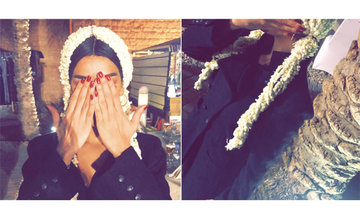LAHORE: With a life that has taken her around Pakistan, Farzeen Irtizaz of design house Rani Emaan had the upbringing of a child raised in the military due to her father's position as an officer.
“I come from Murree but grew up at the different stations (throughout the) four provinces of Pakistan,” she told Arab News. “Wherever my father was stationed, we (were there) to accompany him.”
Prior to 2005, Irtizaz found herself in the Bagh district of Kashmir due to her husband’s posting. It was there that the couple, along with their two young daughters, lived through the destruction of one of the most devastating earthquakes to hit that part of South Asia.
With a magnitude of 7.6 on the Richter Scale and casualties that have been estimated to be close to 100,000, with similar numbers injured and catastrophic damage left in its wake, Irtizaz was forced to embrace a new life and did so with eyes newly opened.
“The quake defined the destiny of many lives and it thoroughly transformed my vision of life. For the very first time I felt being so ephemeral … here today and gone tomorrow.”
The destruction left Irtizaz with two fractured legs.
“Where (an) uncountable (number of) beings had to depart this world, I was thankfully fortunate enough to be a survivor and only suffered the fractures.
“The solid house that I passionately decorated was liquidized in fractions of seconds,” she said. “My two little girls along with my husband could not (find their way around the remains of our home). It was the soldiers around the house who (came) and pulled the whole family out from being stifled to death in debris.”
The unimaginable calamity required residents to be moved almost immediately. “After spending a disastrous morning, afternoon and evening in the vast ground that housed infinite dead bodies, army officers’ families were driven to the nearest safe place for them. For me it was Islamabad, my parental station.”
The turn of events would eventually lead her to build her own luxury bridal brand. “The stay at my parents’ place proved to be eventful as it (was the catalyst) for the establishment of Rani Emaan,” named after her first born daughter Emaan and that of her friend and partner Deeba’s, Rania.
“Rani Emaan’s first ever bridal gown was designed by me for a close family friend’s wedding while recovering in Islamabad,” she explained.
When asked if the brand itself functioned as a way of healing and rebuilding, the designer said: “Rani Emaan has always been a motivation for me. Beyond work, it supplemented my emotional strength and fortified my belief in my abilities and work ethic.”
Rani Emaan’s designs are known for their glamorous take on bridal wear without relying too heavyily on fleeting trends. There is a strong focus on elegance and keeping the cuts simple and focused on presenting the wearer in the best light. Her studios, both in Islamabad and in Washington, DC, where Deeba resides, are a mainstay stop for brides and wedding parties. When asked why she went with bridals initially, she said that designing bridals allows for her to tap into her appreciation of regal touches, throwbacks to times where royals influenced what kind of garments were worn on wedding days.
“(It is) thoroughly gratifying to have hands on experience for reincarnating (that) royal (feeling) in my work from the inception itself,” she said.





























